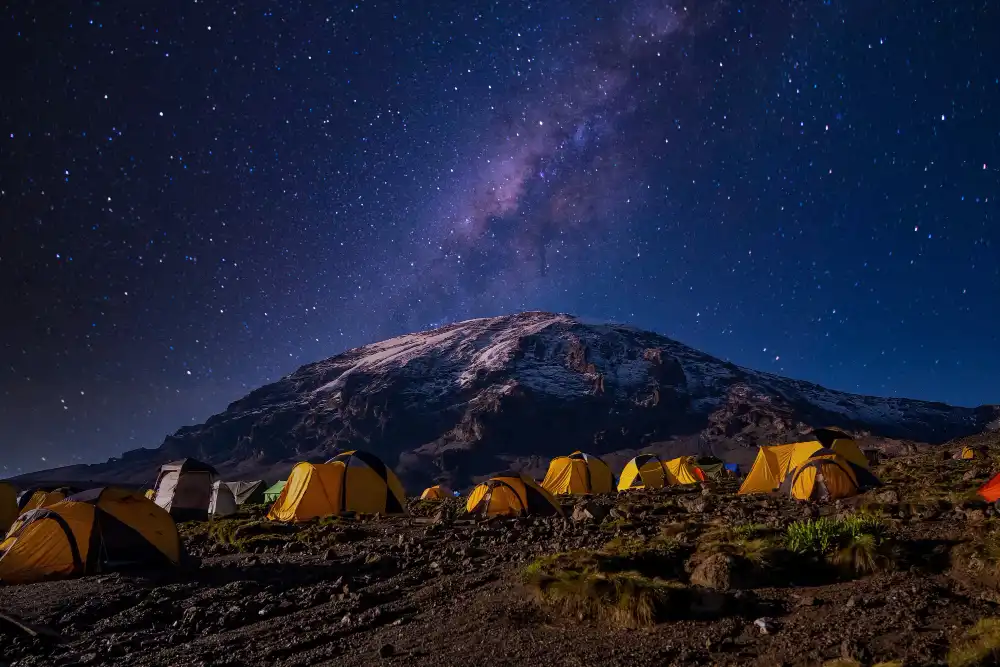Tel : +255 656 208 181 / +44 747 272 241 91 info@zaylatours.com
Preparing for Mountain Climbing
Home > Preparing for Mountain Climbing

Essential Tips for Preparing for Mountain Climbing in Tanzania… Mount Kilimanjaro & Mount Meru
Climbing the majestic peaks of Mount Kilimanjaro and Mount Meru is a once-in-a-lifetime adventure that attracts trekkers from around the globe. Both mountains offer unique experiences, breathtaking views, and challenges for climbers of all skill levels. To help you prepare for your ascent, here are essential tips and insights to ensure a successful and enjoyable journey with Zayla Tours.
- Understand the Routes
Mount Kilimanjaro, the highest peak in Africa at 5,895 meters (19,341 feet), offers several routes to the summit, each with distinct characteristics:
- Machame Route: Known for its scenic beauty, this route is popular among trekkers. It typically takes 6-7 days and is moderately challenging.
- Lemosho Route: A longer, less crowded route that offers stunning views and a good acclimatization profile. It usually takes 7-8 days.
- Rongai Route: This route approaches Kilimanjaro from the north and is less frequented. It’s great for those looking for a quieter experience and takes 6-7 days.
Mount Meru, standing at 4,566 meters (14,980 feet), is often considered a perfect acclimatization trek before Kilimanjaro. The typical route, starting from Momella Gate, takes 3-4 days and rewards climbers with diverse ecosystems and stunning views.
- Choose the Right Time to Climb
The best times to climb these peaks are during the dry seasons, which run from June to October and January to February. These months offer clear skies, stable weather, and optimal trekking conditions. However, climbing during the shoulder seasons can provide fewer crowds and unique wildlife experiences.
- Physical Preparation is Key
Climbing high-altitude mountains requires good physical conditioning. Begin your training at least three months before your climb:
- Cardiovascular Training: Engage in activities like hiking, running, cycling, or swimming to improve your endurance.
- Strength Training: Focus on leg, core, and upper body strength to handle the rigors of climbing.
- Practice Hiking: Take long hikes with a weighted backpack to simulate the climbing conditions you’ll face.
Don’t forget to schedule a few multi-day hikes to prepare for the endurance needed for your ascent.
- Gear Up Wisely
Packing the right gear is crucial for a successful climb. Here’s a checklist of essential items:
- Clothing: Layering is essential. Pack moisture-wicking base layers, insulating mid-layers, and waterproof outer layers. Neutral colors are best for blending into the environment.
- Footwear: Invest in sturdy, well-fitted hiking boots with good ankle support.
- Accessories: Don’t forget a wide-brimmed hat, gloves, sunglasses, and a buff or scarf for sun and wind protection.
- Backpack: A comfortable daypack for carrying your essentials during the hike.
Zayla Tours provides guidance on recommended gear and can assist in arranging rental equipment if needed.
- Acclimatization is Crucial
Acclimatization helps your body adjust to high altitudes and reduces the risk of altitude sickness. Take your time to acclimatize by following these tips:
- Climb High, Sleep Low: This principle involves ascending to a higher altitude during the day and returning to a lower elevation to sleep.
- Stay Hydrated: Drink plenty of water to help your body adjust. Aim for at least 3-4 liters per day.
- Listen to Your Body: Pay attention to symptoms of altitude sickness, such as headaches, nausea, or dizziness. If symptoms worsen, descend immediately.
- Nutrition and Hydration
Fueling your body with the right nutrients is vital for a successful climb. Focus on a balanced diet rich in carbohydrates, proteins, and healthy fats. During your trek, carry high-energy snacks like nuts, energy bars, and dried fruits to keep your energy levels up.
Staying hydrated is equally important, so drink water regularly. Zayla Tours provides safe drinking water throughout your climb to ensure you stay hydrated.
- Safety and Health Precautions
Before your trip, consult a healthcare provider for necessary vaccinations and medications. Common vaccinations may include:
- Yellow Fever: Required for entry from some countries.
- Hepatitis A and B: Recommended for travelers.
- Typhoid: Suggested if visiting rural areas.
- Malaria Prophylaxis: Essential for certain regions in Tanzania.
Consider carrying a personal first aid kit and any personal medications you may need.
- Book with a Reputable Tour Operator
Choosing a reliable tour operator is key to a successful climbing experience. Look for operators with excellent reviews, experienced guides, and a commitment to safety and sustainable tourism practices. At Zayla Tours, we prioritize your safety and satisfaction, offering expertly guided climbs on both Mount Kilimanjaro and Mount Meru.
- Embrace the Journey
Climbing Mount Kilimanjaro or Mount Meru is not just about reaching the summit; it’s about embracing the journey. Enjoy the stunning landscapes, the diverse wildlife, and the camaraderie with fellow climbers. Capture the memories, and savor each moment along the way.
Start Your Climb with Zayla Tours
Are you ready to take on the challenge of climbing Mount Kilimanjaro or Mount Meru? Contact Zayla Tours today to start planning your unforgettable mountain adventure. Our expert team will help you craft a personalized itinerary that matches your goals and ensures a rewarding climbing experience in Tanzania.
WRITE US A REVIEW

CONTACT US
- Zayla Tours
- Zayla Tours
- @zaylatours
- info@zaylatours.com
- +255 656 208 181 / +44 747 272 241 91
- United Kingdom: +44 747 272 241 91
- Tanzania: +255 656 208 181
- Reservations: +255 743 535 349
- Field Office: +255 785 089 584
- Arusha, Tanzania
WE ACCEPT


